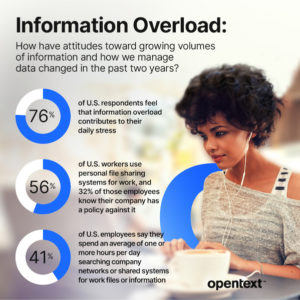
Report: 80% of Global Workers Experience Information Overload

OpenText, provider of an integrated information management platform, has released the results of a survey that found eight out of 10 global workers are suffering from information overload due to siloed data in too many places, along with poor data access and governance.
Volumes of data are rapidly growing, and a Statista report found the amount of global data is slated to reach 180 zettabytes by 2025. This glut of data is taking a toll, according to OpenText. Of those surveyed in the U.S., 76% felt that information overload contributes to their daily stress. Another 35% percent said this overload is having a detrimental effect on their work performance, with 30% revealing it is affecting their overall job satisfaction.
One factor driving information overload is just how many sources exist, with 26% of U.S. workers reporting using eleven or more accounts, resources, tools, and applications each day. From emails, company drives, shared drives, and collaboration platforms, to social media and news feeds, many are feeling overwhelmed by how much information exists and how often they are expected to check these sources.
Poor data management and access for these large volumes of information are also concerning issues, with 41% of U.S. employees saying they spend an average of one or more hours per day searching company networks or shared systems for work files or other information due to data often being siloed. Over a third of respondents, 34%, say access to corporate file systems and content is not as readily available when working remotely and 30% reported that sharing files and collaborating with colleagues is more difficult when working from home. An additional 43% of U.S. hybrid workers said they are not or are only somewhat equipped with the necessary digital tools to work remotely.
Compromised data security due to limited access is also an issue. Of the U.S. workers surveyed, 56% admitted to using personal file sharing systems like DropBox or Google Drive for work, and 18% confessed to doing so despite being aware of a company policy prohibiting such activity due to the inherent security risks.
 The latest survey is a follow-up to a previous OpenText information survey from the early days of the pandemic, March 2020. The company relaunched the survey to find out how outlooks regarding information overload and data management in the workplace have changed since the early pandemic rush of remote work. The 80% who experience information overload in the latest survey is up from 60% in 2020. Additionally, those who said they use eleven or more resources each day totaled 27% in this latest survey, up from 15% in 2020, and 34% of U.S. workers said the number of sources has increased a lot in that time.
The latest survey is a follow-up to a previous OpenText information survey from the early days of the pandemic, March 2020. The company relaunched the survey to find out how outlooks regarding information overload and data management in the workplace have changed since the early pandemic rush of remote work. The 80% who experience information overload in the latest survey is up from 60% in 2020. Additionally, those who said they use eleven or more resources each day totaled 27% in this latest survey, up from 15% in 2020, and 34% of U.S. workers said the number of sources has increased a lot in that time.
OpenText concludes that automation of information access and governance is the solution for these challenges. Automation can reduce friction caused by information overload and can help businesses eliminate silos and simply data management to ensure more effective access.
The company notes that enterprise content management, traditionally conducted on-premises, has now evolved to cloud-native content applications that account for remote workers by allowing access regardless of location in a secure and governed manner. “With content services, isolated processes and data repository siloes are bridged and it becomes much easier to give people access to information, roll it out and configure it globally for an entire organization. The modern way of providing content services goes beyond just managing information to being more about flexibility and extracting value from your content. You extend capabilities as you need them in a modular, iterative, and agile way,” said Executive Vice President and Chief Marketing Officer for OpenText, Sandy Ono, in a blog post.
The survey was commissioned by OpenText and conducted by 3Gem in March 2022. For the research, 27,000 consumers were anonymously surveyed globally, across the UK, U.S., Germany, Spain, Italy, France, Australia, Canada, Singapore, India, Brazil, and Japan.
Related Items:
Three Ways to Connect the Dots in a Decentralized Big Data World
Analytics and AI Not Being Fully Utilized for Audits and Compliance Investigations: Report
How Unified Data Access Governance Will Determine the Winners and Losers in the New Data Economy



























